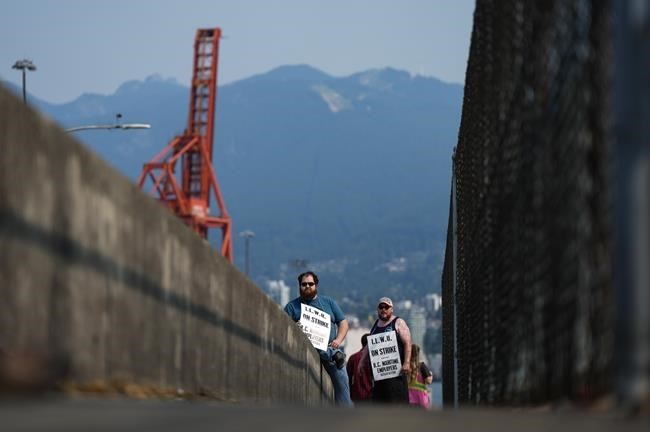The union representing about 7,400 port workers in British Columbia has announced that its members have voted to reject a mediated contract with employers, in a move that prolongs uncertainty surrounding the province's ports.
Here is a timeline surrounding the events.
2022
Nov. 30: The British Columbia Maritime Employers Association provides notice to commence collective bargaining to the International Longshore and Warehouse Union Canada.
2023
Feb. 16: Negotiations begin.
March 20: The ILWU serves a notice of dispute to the federal government, signalling an impasse, and requests the appointment of a conciliation officer.
March 29: Talks enter a 60-day conciliation period.
March 31: The existing collective agreement between the BCMEA and the ILWU expires.
May 30: Conciliation ends. Talks enter a cooling-off period of 21 days.
June 5: The ILWU's negotiating committee authorizes a strike vote to be conducted on June 9 and 10.
June 12: The ILWU says members voted 99.24 per cent in favour of supporting strike action if necessary.
June 28: The ILWU serves 72-hour strike notice.
June 30: Both sides say cruise ships will continue to be serviced.
July 1: Strike commences at B.C. ports, shutting down operations at most of the province's marine terminals.
July 3: The ILWU says the BCMEA has walked away from the negotiating table. The BCMEA says it is a pause to reset talks.
July 8: The two sides meet again with mediators about a deadlock on maintenance work. The BCMEA says the ILWU rejected a proposal.
July 11: Federal Labour Minister Seamus O'Regan asks a mediator to draft terms for a potential settlement agreement.
July 13: The BCMEA says a tentative, four-year agreement has been reached with the ILWU. Port operations resume. In a tweet, O'Regan declares "the strike is over."
July 18: The ILWU says its leadership caucus voted down the mediator's terms, and workers are back on strike. Picket lines resume. O'Regan and federal Transport Minister Omar Alghabra say in a statement that the disruptions at B.C. ports "cannot go on" and officials are now looking at "all options."
July 19: The Canada Industrial Relations Board rules the ILWU's move to strike on July 18 was unlawful because no 72-hour notice was provided. The ILWU issues a new 72-hour notice to strike, but rescinds the notice hours later. Prime Minister Justin Trudeau convenes the incident response group.
July 20: The ILWU's leadership announces it is recommending the agreement and it will be put to a membership vote.
July 27-28: ILWU members vote on the agreement.
July 28: ILWU announces that its members have voted to reject the agreement.
This report by The Canadian Press was first published July 29, 2023.
The Canadian Press




